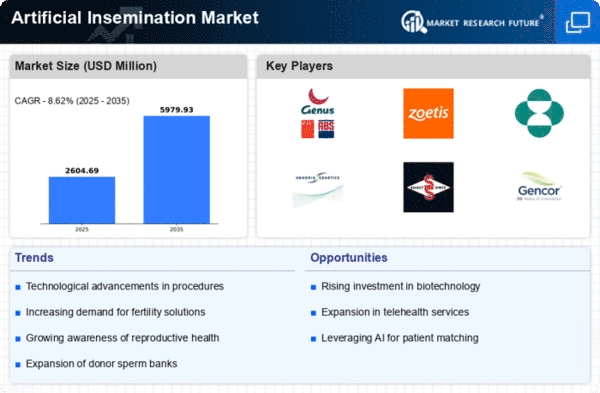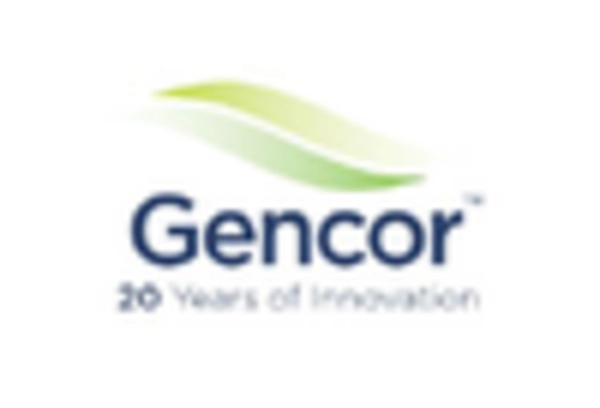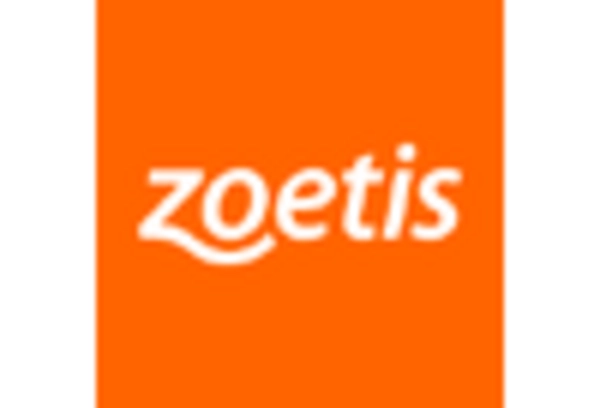Market Analysis
In-depth Analysis of Artificial insemination Market Industry Landscape
The market dynamics of Artificial Insemination (AI) reflect a growing demand for advanced reproductive technologies in the agricultural and healthcare sectors. AI, a technique involving the introduction of sperm into a female's reproductive system without natural mating, has witnessed significant advancements, driving its market dynamics. Agriculture is a crucial factor in AI market development representatives as there is an increasing need in the market for advanced breeding techniques to improve livestock genetics. AI allows for controlled breeding that translates to proper herd management, enhanced milk production and more healthy livestock AI technologies have different innovations which are continuing and they boost the growth of the dynamic market. Due to the increased degree of the semen processing measures that have been taken, new advancements in equipment that can be used in insemination, as well as the production of AI kits that are intended to be humanized, artificial insemination is more widely available and more efficient for farmers and veterinarians alike. It has significantly increased in awareness on the positive values that AI have brought both in human and animal reproductive process. Various educational programs and workshops for farmers and healthcare professionals have had pivotal importance in spreading the knowledge about the merits of AI thereby influencing market trends. The healthcare sector has emerged as one of the pillars holding up the AI market, with the increasing practicability of HI treatments. With fertility problems are becoming a trend among couples, artificial insemination is now a viable way to resolve, hence market growth. Economically, AI techniques provide inexpensive substitutes for assisted reproductive technologies of greater complexity. Socioeconomic drivers, such as population, food requirements, and global health changes, determine the dynamic characteristics of the AI market. The global spread of human overpopulation increases the demand for better agricultural techniques and health services which in turn might lead to artificial insemination. The regulation policy is also a major contributor to the dynamics of AI market. The need to constantly adhere to strict rules aimed at guaranteeing the quality and safe use of AI procedures seems to affect market players pushing innovation and standardization in the field. The AI market has the following disadvantages like ethical issues, diversity as well as the lack of enough professionals for market work. But these risks also provide chances for research and development, so it generates an interesting momentum that enables firms to find new solutions to promote their market shares. Key players in the AI market are engaged in stiff competition. With technological advances, partnerships, branding, and marketing, companies aim at being competitive while the market in the meantime becomes even more unstable due to this. However, the COVID-19 pandemic has impacted the AI market in its challenge as well as its opportunity aspects. COVID-19 has affected the market, initially causing disruptions in the supply chain and then lower accessibility to healthcare services, but it also speeded up the digital health solutions adoption, such as telemedicine consultations in AI procedures. The future of the AI market appears promising, driven by ongoing research, technological innovations, and increasing acceptance in various industries. As the demand for efficient reproductive solutions continues to rise, the market dynamics are expected to evolve further, presenting new opportunities for growth and development.


















Leave a Comment